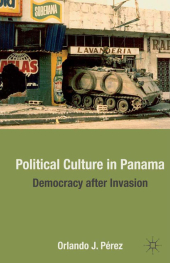 Neuerscheinungen 2010Stand: 2020-01-07 |
Schnellsuche
ISBN/Stichwort/Autor
|
Herderstraße 10
10625 Berlin
Tel.: 030 315 714 16
Fax 030 315 714 14
info@buchspektrum.de |

O. Pérez
Political Culture in Panama
Democracy after Invasion
1st ed. 2011. 2010. v, 203 S. 216 mm
Verlag/Jahr: SPRINGER PALGRAVE MACMILLAN; PALGRAVE MACMILLAN US 2010
ISBN: 1-349-28685-0 (1349286850)
Neue ISBN: 978-1-349-28685-0 (9781349286850)
Preis und Lieferzeit: Bitte klicken
The most comprehensive and empirically grounded analysis of the institutional and attitudinal factors that have shaped Panamanian politics since the 1989 U.S. invasion. Panama offers a unique opportunity to understand the long-term effects of United States policy and the challenges of building democracy after a military invasion.
PART I: POLITICS AND SOCIETY IN PRE-INVASION PANAMA, 1903-1989 Elites and the United States During the Early Period of Nation Building, 1903-1968 The National Guard, Elites and the United States, 1968-1981 Economic Crisis, Political Opposition, and the U. S. Military Invasion, 1981-1989 PART 2: POST-INVASION PANAMA: INSTITUTIONAL RECONVERSION AND DEMOCRATIC POLITICAL CULTURE, 1989-2009 Institutional Reconversion in Post-Invasion Panama Elections and Political Participation in Post-Invasion Panama Tolerance and Political System Support in Post-Invasion Panama Government Performance and Democratic Stability in Post-Invasion Panama Lessons from Panama: Can Democracy Endure in the Aftermath of a U.S. Military Intervention?
"Orlando Pérez is the leading expert on politics in Panama. His new book, based on an extraordinary collection of personal interviews, documents and public opinion data, is the definitive study of post-invasion period, and will become the source of reference for all serious scholars of Central America and small states more generally. Ideal for classroom adoption." - Mitchell A. Seligson, Centennial Professor of Political Science, and Director of the Latin American Public Opinion Project (LAPOP)
"Orlando Perez has produced an indispensable guide through the labyrinth of Panamanian politics and has raised provocative questions regarding the U.S. role in its difficult transition to a more democratic culture which have implications for current policy." - Dr. Richard L. Millett, Professor Emeritus at Southern Illinois University and Senior Advisor for Latin America to the PRS Group
"Orlando Perez´s new book, Political Culture in Panama, is a pathbreaking look at the saga of elite politics and military denouement, often orchestrated from abroad, that until 1989 kept Panama prisoner of its own past and contemporary political and commercial alliances. Although much as been written on the U.S. invasion of that year, statesmen, historians and political scientists as well as ordinary citizens in Panama and abroad needed something to help them understand how Panama has broken the chains of democratic charade, and moved into the ranks of truly functioning elected governments. Perez´s work admirably fulfills that need." - Martin Edwin Andersen, author of Peoples of the Earth, Ethnonationalism, Democracy and the Indigenous Challenge in ´Latin´ America
"Pérez´s study of the crucial Panamanian case provides a refreshing analysis of political culture and development after a foreign intervention. He uncovers how both the 1989 U.S. invasion and the immanent transfer of the canal evolved into a critical juncture that encouraged elites to change their views on democracy, thus installing a strong foundation for democratization. His conclusions are based upon a rich combination of fieldwork, elite interviews, survey data, and skilled historical analysis." - Jennifer S. Holmes, Associate Professor of Political Economy and Political Science, University of Texas at Dallas
"Orlando Pérez makes a major contribution to understanding the post-invasion Panamanian political system. His book melds political history with cultural analysis based on several rounds of unusually rich public opinion surveys collected since 2004. The combination provides valuable new insights into this understudied country, its elite settlement on democracy, and its emergent democratic culture." - John Booth, Regents Professor of Political Science, University of North Texas


